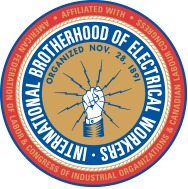The National Day of Mourning, held annually on April 28th, was officially recognized by the federal government in 1991, eight years after the day of remembrance was launched by the Canadian Labour Congress (CLC), and has since spread to at least 80 countries around the world. This day is a tribute to those who have died as a result of a workplace illness or accident.
The IBEW was originally formed by workers who wanted to improve safety in their workplace. Our union was formed on the need for safety at a time when 1 in 2 electrical workers were being killed on the job every day; even our own founding President Henry Miller died from a workplace incident. Today, safety continues to be a main focus of our Local Unions mandate; safety is paramount to the IBEW!
With respect to this year’s National Day of Mourning, the theme on April 28th is “Work Shouldn’t Hurt: Make Health and Safety a Fundamental Principle and Right at Work”. Just over two years after the World Health Organization declared COVID-19 a global pandemic, Canada has recorded over 3.5 million cases of COVID-19 and 37,728 deaths. Over the same period, workers have continued to be injured, made sick or killed from unsafe working conditions and a wide range of hazards.
At this point in the pandemic, governments are choosing to loosen restrictions which is having a negative impact on workers. With the increased transmissibility of the Omicron variant, more and more Canadians are contracting the virus. Workers were already facing dangerous levels of burnout particularly in the health care sector. With more Canadians contracting the virus and needing to stay home to recover, the burden of keeping sectors afloat with a shortage of staff is even worse. Worker burnout has a huge impact on the health of our workforce, both physically and mentally.
This is also an important year as May 9, 2022, marks the 30th anniversary of the Westray mine disaster, where 26 miners were killed in an underground explosion in Pictou County, Nova Scotia. After a long campaign, critical changes made to the Criminal Code of Canada were meant to ensure similar tragedies never happen again, but criminal charges are almost never pursued in workplace fatalities. We need to hold our government accountable and ensure that they prioritize robust enforcement of existing health and safety regulations and commit to enforcing the Westray sections of the Criminal Code.
In Canada, approximately, 1,000 worker deaths a year are recognized by governments and workers’ compensation boards, and we know this is just the tip of the iceberg. In 2019, the most recent year for which statistics are available, there were 925 accepted workplace fatalities, and 271,806 accepted lost time claims in Canada.
No worker should die from their job; workers deserve to arrive home safely at the end of their workday but too many workers are dying from work. Workplace accidents and illnesses are preventable and should never be seen as “just part of the job”. Workers need to be reminded that they have the right to know about the hazards in their workplace and receive the training they need to be able to do their jobs safely. They have the right to participate in decisions that could affect their health and safety and most importantly they have the right to refuse work that could endanger their health and safety or that of others.
April 28th is the day we remember those whose lives were lost and those whose lives were forever changed because of something that happened in their workplace. It is also the day when we resolve to make every workplace a safe and healthy place to earn a living.
This is the first year since the start of the pandemic that we will be able to hold vigils and ceremonies in person. The CLC has compiled a list of events being held by local District Labour Councils and Federations of Labour. Please consult the list to see what is available in your area. Canada’s Building Trade Unions (CBTU) are holding their ceremony on April 28th at 11:00 am EDT at the Construction Worker Monument at Major’s Hill Park in Ottawa.
We must continue to bring visibility to the importance of commemorating the National Day of Mourning. We must insist that all levels of government do more to enforce existing health and safety laws and vigorously prosecute violations when a worker is killed or seriously injured. We owe it to the families who have lost their loved ones to preventable workplace accidents and illnesses to do better for today’s workers. Everyone deserves to return home to their loved ones at the end of the day.



